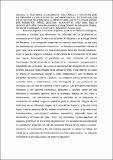| dc.contributor.advisor | Fonseca Zúñiga, Gerardina | |
| dc.contributor.author | Gamboa Araya, Noelia Alejandra | |
| dc.date.accessioned | 2020-09-28T23:50:40Z | |
| dc.date.available | 2020-09-28T23:50:40Z | |
| dc.date.issued | 2010 | |
| dc.identifier.uri | http://hdl.handle.net/11056/18262 | |
| dc.description | Tesis presentada en la División de Educación Sede Región Brunca, Universidad Nacional para optar por el grado de Licenciatura en Orientación | es_ES |
| dc.description.abstract | Esta investigación tuvo como propósito, analizar los factores sicológicos, culturales y sociales que determinan la necesidad de un profesional en orientación en el Hogar de Atención al Menor Ambulante y en el Hogar Madre del Redentor. La investigación responde a un estudio cuantitativo, ya que basa los resultados en información estadística. La literatura consultada muestra el gran valor de la orientación en otras instituciones fuera del sistema educativo, como lo son los hogares sustitutos, evidenciando la trascendencia de la labor que puede desempeñar el orientador en otras instancias no menos importantes; las funciones de un profesional en orientación, competencias y habilidades del orientador, así como la importancia del bienestar de los niños y jóvenes, para que éstos tengan mejor calidad de vida. Para obtener los datos se diseñó un cuestionario dirigido a cinco poblaciones y sus resultados se presentan mediante cuadros y gráficos. La población estuvo conformada por cuarenta niños y adolescentes, ocho encargados y una profesional en sicología, para un total de cuarenta y nueve sujetos. Los principales resultados muestran a los factores sicológicos, culturales y sociales como de alta influencia e incidencia positiva, para el bienestar integral de los niños y adolescentes. Las conclusiones indican la necesidad de un profesional en orientación en ambos hogares sustitutos, para el desarrollo integral de los individuos en las diferentes etapas de la vida del ser humano, y de esta forma lograr mejorar aspectos de los sujetos en estudio, en cuanto a las relaciones interpersonales, comunicación asertiva, autoestima, adecuada toma de decisiones y proyecto de vida. Entre las principales recomendaciones se sugieren, promover en los centros de protección, los servicios de un profesional en orientación, logrando con ello un desarrollo integral de los niños y jóvenes. Asimismo, se recomienda a los orientadores expandir su campo de trabajo, por medio de la realización de investigaciones en otras instituciones y no reducirse únicamente a las instituciones del sistema educativo. | es_ES |
| dc.description.abstract | The purpose of this research was to analyze the psychological, cultural and social factors that determine the need for a professional in orientation in the Home for the Care of the Ambulant Child and in the Mother Home of the Redeemer. The research responds to a quantitative study, since it bases the results on statistical information. The literature consulted shows the great value of orientation in other institutions outside the educational system, such as the substitute homes, evidencing the importance of the work that the counselor can perform in other no less important instances; the functions of a professional in orientation, competencies and skills of the counselor, as well as the importance of the well-being of the children and youth, so that they have a better quality of life. To obtain the data, a questionnaire was designed for five populations and its results are presented in tables and graphs. The population was made up of forty children and adolescents, eight caregivers and one professional in psychology, for a total of forty-nine subjects. The main results show the psychological, cultural and social factors as of high influence and positive incidence, for the integral well-being of children and adolescents. The conclusions indicate the need of a professional in guidance in both substitute homes, for the integral development of the individuals in the different stages of the human being's life, and in this way to manage to improve aspects of the subjects in study, as for the interpersonal relationships, assertive communication, self-esteem, adequate decision making and life project. Among the main recommendations, we suggest promoting the services of a professional in guidance in the protection centers, thus achieving an integral development of children and young people. Likewise, it is recommended that counselors expand their field of work by conducting research in other institutions and not be reduced only to the institutions of the educational system. | es_ES |
| dc.description.sponsorship | Universidad Nacional, Costa Rica | es_ES |
| dc.language.iso | spa | es_ES |
| dc.publisher | Universidad Nacional, Costa Rica | es_ES |
| dc.rights | Acceso abierto | es_ES |
| dc.rights | Attribution-NonCommercial-NoDerivatives 4.0 Internacional | * |
| dc.rights.uri | http://creativecommons.org/licenses/by-nc-nd/4.0/ | * |
| dc.subject | ASPECTOS SOCIALES | es_ES |
| dc.subject | PEREZ ZELEDON (SAN JOSE) | es_ES |
| dc.subject | ENSEÑANZA PRIMARIA | es_ES |
| dc.subject | ORIENTACION PROFESIONAL | es_ES |
| dc.subject | SOCIAL ASPECTS | es_ES |
| dc.subject | PRIMARY EDUCATION | es_ES |
| dc.subject | PROFESSIONAL ORIENTATION | es_ES |
| dc.title | Factores psicológicos, culturales y sociales que determinan la necesidad de un profesional en orientación en el Hogar de Atención al Menor Ambulante y Hogar Madre del Redentor, Pérez Zeledón, 2010. | es_ES |
| dc.type | http://purl.org/coar/resource_type/c_7a1f | es_ES |
| una.tesis.numero | 6894 | es_ES |
| dc.description.procedence | Sede Regional Brunca, Campus Pérez Zeledón | es_ES |



